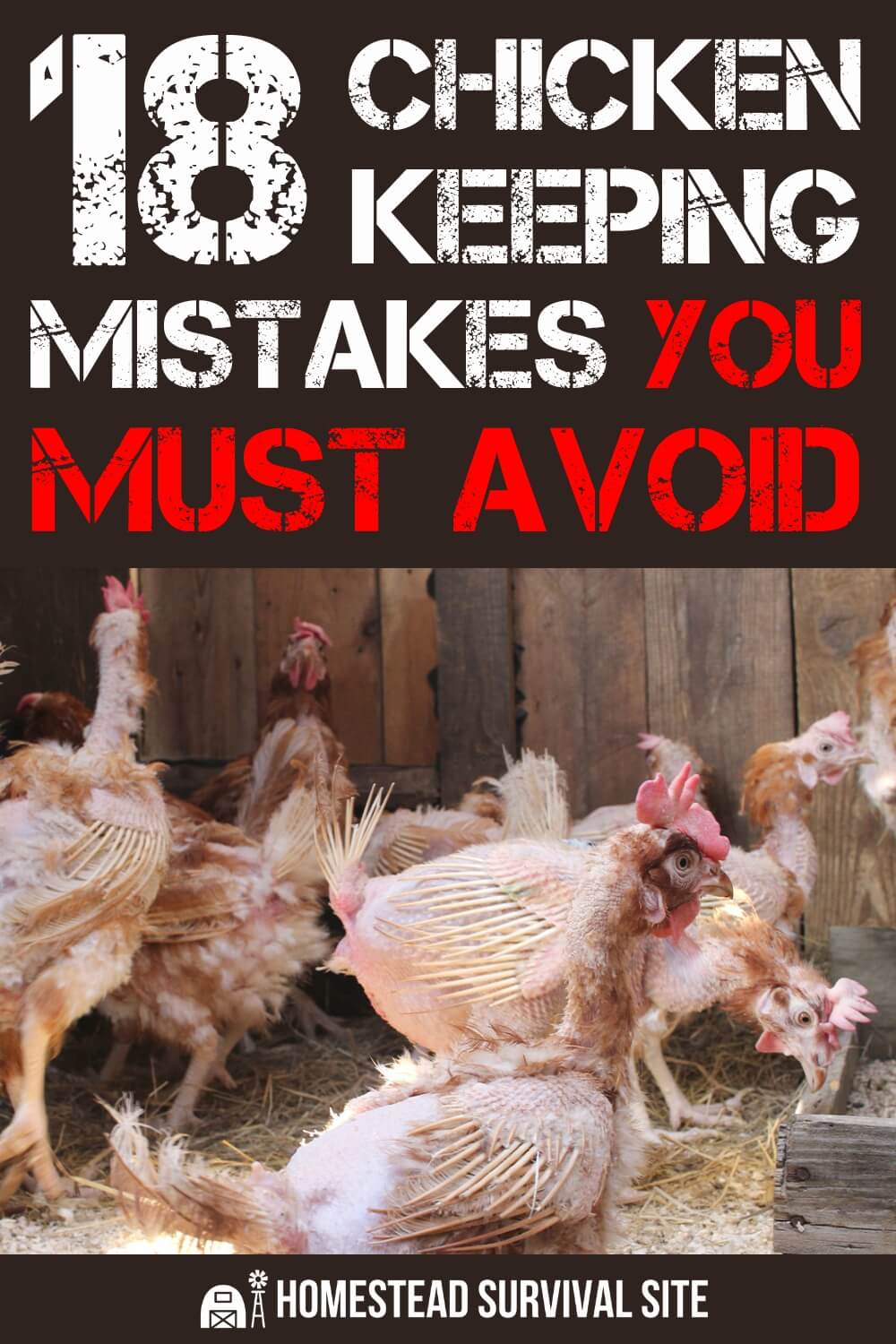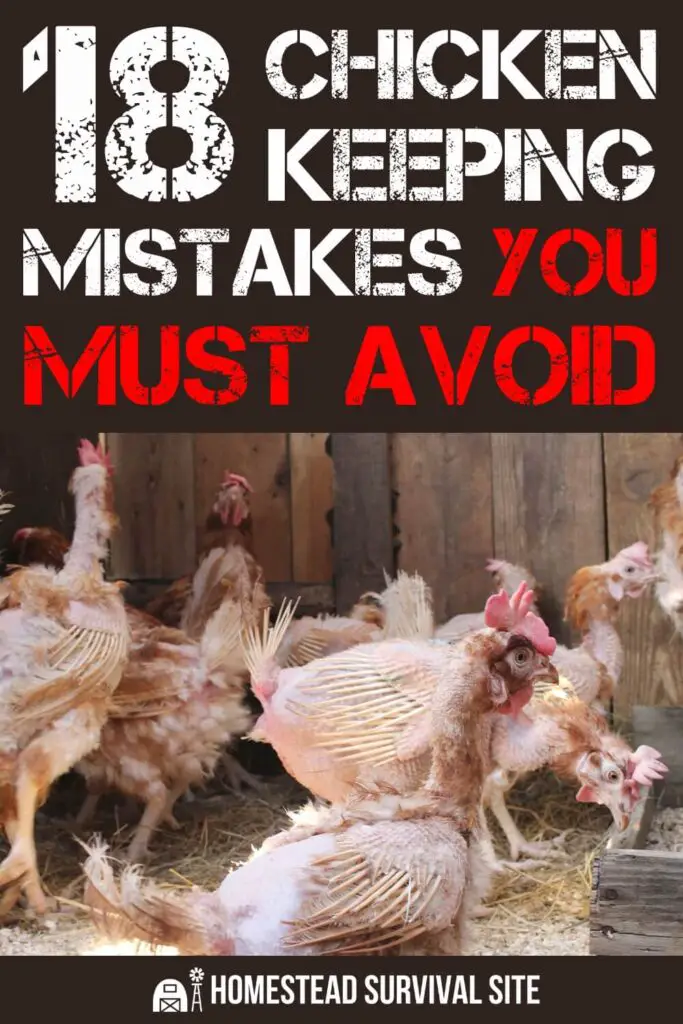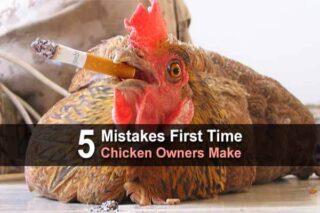Estimated reading time: 12 minutes
I did a lot of research before I purchased my first flock of chickens, but I still made a ton of newbie chicken keeping mistakes. If there was a mistake, I probably made it! From diet choices to predator protection, there can be a lot to learn.
I’ve absorbed a lot of chicken information over the years, and I work hard to make sure my chickens are both happy and healthy so they can have a great life and we can have great eggs.
Here are just some of the most common mistakes that new chicken keepers make – and how to avoid them.
Want to save this post for later? Click Here to Pin It On Pinterest!
Ignoring Local Laws
First things first, you must check your local laws before you bring home your first feathered friends. You need to know if you're allowed to keep chickens, and if so, how many, and if roosters are permitted.
Different locales have different laws, so you need to check what is legal for the address where you will be keeping your chickens. Otherwise, you might end up with fines and forced removal of your flock. You may be able to get local laws changed or adjusted, but you’ll want to do that before you get your chickens.
Keeping Too Many Roosters
First of all, there may be a limitation on roosters where you live. But even if there isn’t, you don’t want to make the mistake of having too many roosters in your flock. Ideally, you won’t have more than one rooster per 10 hens. You may be able to get away with more IF you have very docile roosters, but having too many can be dangerous.
Roosters can become more aggressive if there are too many of them together. They may overbreed your hens and injure them, they may fight with each other, and they may even come after people or other animals.
It’s easy to end up with too many roosters when you hatch out your own chickens from eggs, so be sure to have a plan for what you will do with the extras. It could be disastrous for your hens or your small children if you have too many males that turn aggressive.
Skipping the DE
Diatomaceous earth, or DE, is a natural substance that is extremely beneficial for chickens. You can sprinkle it in the coop to cut down on mites, add it to their dust baths to prevent lice, and even add it to their feed in small amounts. It’s probably the easiest thing you can do to keep your chickens from getting mites. Not using it can mean itchy, unhealthy hens.
Too Little Shade
Many breeds of chickens do better in cooler weather than in the hot summer sun. So, if it gets toasty where you are, make sure your chickens have a place to get out of the sun. Chickens can overheat and suffer from heat stroke.
You’ll know your chickens are too hot if they seem lethargic, and you can see them visibly panting. Keep in mind that if you’re hot, they are, too. A tree, bush, or even a little sunshade will go a long way towards helping them stay cool. Keep their water in the shade, too, so they have cooler water to drink.
Too Little Sun
If you want eggs, you need sunlight. If you keep your chickens in a dark, covered pen all of the time, chances are, they won't lay eggs consistently. Chickens need about 14 hours of light per day to lay eggs consistently – and sunlight is much better than artificial lights (although that works, too).
Not Enough Ventilation
A cozy keep will help your chickens stay warm, but a coop without ventilation is a big mistake. Chickens create a lot of ammonia in their excrement, and they seem to make even more when they sleep than when they’re awake! The result is a coop that is full of smelly chicken poo.
Too much ammonia build-up in the coop can cause upper respiratory infections in chickens. It’s also very unsafe for humans. So you need plenty of ventilation in your coop to let out fumes, but not so much that it causes a draft.
Generally, vent holes above the roosts, just below the roof line, are ideal, but it depends on the size and shape of your coop.
Not Enough Wind and Weather Protection
Chickens need a draft-free, dry place to sleep at night. Being wet or in a draft can make your chickens sick and even kill them. Make sure your coop provides enough protection from the wind, rain, and snow so they can stay warm and dry.
Using Heaters In The Coop
Using heat in the coop is a bit of a touchy subject! In most locations, for most chickens, you don’t need heat, and it can even cause a dangerous situation.
Chickens can keep themselves warm (they have a fluffy, feathery coat, after all, and a higher body temperature than humans), so as long as they are dry and out of the wind, they are usually just fine no matter how cold it gets. However, if you live in a particularly artic region, you’ll want to ask local chicken farmers what they do.
Adding heat to the coop can cause a fire hazard, especially if you are using heat lamps. And it also makes your chickens dependent on the heat, so if the power goes out and your chickens are suddenly subjected to the cold, they will fare worse than if they had been acclimated to colder temperatures.
There are a couple of exceptions, though. Chicks need to have access to a heat source (mama hen counts, though) until they are fully feathered. A few specialized breeds, like Seramas, hail from tropical areas and don’t do well in the cold. You’ll need to make special accommodations for these types of fowl, but otherwise, you most likely don’t need to use heat in your coops.
Not Enough Predator Protection
Pretty much everything wants to eat your chickens. Hawks, foxes, coyotes, owls, mink, raccoons, large rats, and even domesticated dogs see your chickens as an easy meal or a fun play toy. And one of the most common mistakes that new chicken owners make is not protecting your chickens from predators.
You might be lucky for a few weeks, but as soon as predators discover there are tasty chickens around, you’re going to have a fight on your hands.
There are a number of ways to protect your chickens during the day, but at night, you need to have a coop that you can lock up tight, with no holes bigger than a quarter of an inch. A rat can squeeze through a hole as small as a quarter, and a mink can ooze into a space of an inch. Check your coop often for holes or damage so nothing can sneak in while you’re sleeping!
During the day, if you keep your chickens in a pen, you’ll want to use hardware cloth, rather than chicken wire, to keep out predators. Consider burying hardware cloth about a foot down into the ground, as well, because foxes will dig under fences of all kinds.
You’ll want to enclose the run, as well, because they can climb over the top, and hawks can easily swoop down into the pen. Hardware cloth keeps out smaller predators, such as rats and minks. And it keeps raccoons from grabbing a chicken from the outside.
If you free-range your chickens, you’ll need to provide them with plenty of cover so they can hide from hawks. But you’ll probably have to be ok with losing a few chickens every year unless you provide them with a livestock guardian dog.
Electric fences can help, but they don’t prevent attacks from above.
Dusk and dawn are critical times for predators, so you may want to be extra vigilant at this time of day. We had a fox sneak into the chicken coop right after the chickens went in, and right before we went to shut the door. The final result was a devastating loss, all because we were a little bit late getting to the evening chores.
Not Feeding The Right Amount
Another big mistake that newbie owners often make is over or underfeeding their chickens. Overfeeding can result in wasted food, obese chickens, and even impacted crops. Feeding too little can make your chickens aggressive, lower their immune systems, and cause them to stop laying. It can also lead to bad habits, like chickens who eat their own eggs.
Generally speaking, a laying hen eats about ¼ pound of commercial feed per day per hen. This can vary if you have jumbo hens or bantams, though. Also, if you feed food scraps, you need to make sure you are only feeding things that are safe for chickens to eat (chocolate and avocados aren’t good for chickens at all).
If they free-range, they’ll eat much less commercial feed, but they’ll probably still need some. Not all chickens are great foragers – some breeds are much better than others.
Not Providing Enough Fresh Water
Chickens can easily drink a pint of water per day, but they can drink much more in the summer months. They need free access to clean, fresh water all day long. Dirty water can make them sick, and too little water can cause dehydration or heat stroke in the summer.
Not Offering Grit
Chickens don’t have teeth! And because of that, food can still be in pretty large pieces when it reaches their stomach. Grit helps them to grind up their food in their stomachs.
Chickens that free-range will often eat very fine grit while they are picking at bugs and vegetation, but chickens kept in runs may not be able to get enough grit on their own. This can lead to poor digestion, impacted crops, illness, and death.
Oyster grit gives them the grit to grind up their foods and provides a calcium boost, leading to stronger egg shells and better-quality eggs.
Not Collecting Eggs Often Enough
Keeping fresh, unwashed eggs at room temperature for about two weeks is safe. However, leaving eggs in the coop can subject them to temperature changes and too much heat, which can make them go bad more quickly. Eggs that have been left for a long time can rot on the inside and essentially explode when moved or touched.
More likely, though, if you don’t collect eggs for a few days, one of your hens will turn broody and collect them all together. She’ll get really grumpy for a few weeks as she tries to hatch out the eggs.
Broodiness can be a bit contagious, too, so you may end up with an entire coop of hens that just want to sit on eggs all day (without providing you with any new ones!) Of course, the end result will probably be a whole bunch of baby chicks, which can be a lot of fun!
Not Protecting Baby Chicks
Our chickens and goats share a pen, which works out great 99% of the time. However, occasionally, when chicks hatch, they get lost in the pen. We had a very unfortunate incident where a goat accidentally stepped on a chick that had wandered too far from its momma. It was devastating for my kids, who were there when it happened.
I learned the hard way to collect the baby chicks and the mama hen and keep them in a nearby – but separate coop. A small, manufactured coop from Tractor Supply or even Amazon works great for this purpose. It provides a small coop and pen area for the mom and babies and keeps them extra safe from predators and clumsy goats.
If you don’t have access to a separate coop, you can keep the momma hen and babies in a large dog crate (as long as the babies can’t squeeze out) or even a large Rubbermaid tote. However, if you use this method, you’ll have to reintroduce them to the flock, which might change the pecking order.
Not Cleaning The Coop
As we mentioned before, chicken excrement adds up fast and creates a lot of odors and fumes. Regular cleaning, or using the deep litter method, will help keep fumes to a minimum. A dirty coop also leads to dirty eggs, which can be quite unsavory.
Not Lining The Nest Boxes
It’s also important to line the nest boxes. You can use straw, pine shavings, or even nest box liners. These will prevent your eggs from getting dirty and broken and encourage the hens to lay in the nest box rather than somewhere else in your yard.
Butchering Too Late or Not Butchering At All
A big mistake that newbie chicken owners make is trying to ‘rescue’ meat chickens and turn them into laying hens. It sounds great in theory, but meat chickens are bred to have large, heavy breasts, which is not really conducive to living a normal chicken life.
If a meat chicken isn’t butchered, it could very well end up suffering from obesity and heart disease, and its legs may not be able to support the weight of its body.
If you’re going to raise meat chickens, make sure you butcher them at the right time so they don’t suffer.
Not Having a Vet
Many chicken farmers will be their own chicken doctor, but if you don’t have much chicken experience, you’ll need an avian vet on standby. Chickens can get all kinds of illnesses, from bumble foot to Marek’s disease, and it can help to have a vet who can check for parasites and give advice.
And while you may not be able to take your chicken to the vet for every sneeze or sniffle, it can be reassuring to have someone to call if your entire flock starts acting ill.
Worrying Too Much
As a new chicken owner, one of the biggest mistakes I made was worrying too much! Chickens are, overall, pretty easy to care for, resilient, and don’t need tons of space. But they do have a few essential needs, like adequate shelter, food, water, and protection. Try to nail those things down, and instead of worrying so much, enjoy your chickens!
Like this post? Don't Forget to Pin It On Pinterest!
You May Also Like:












